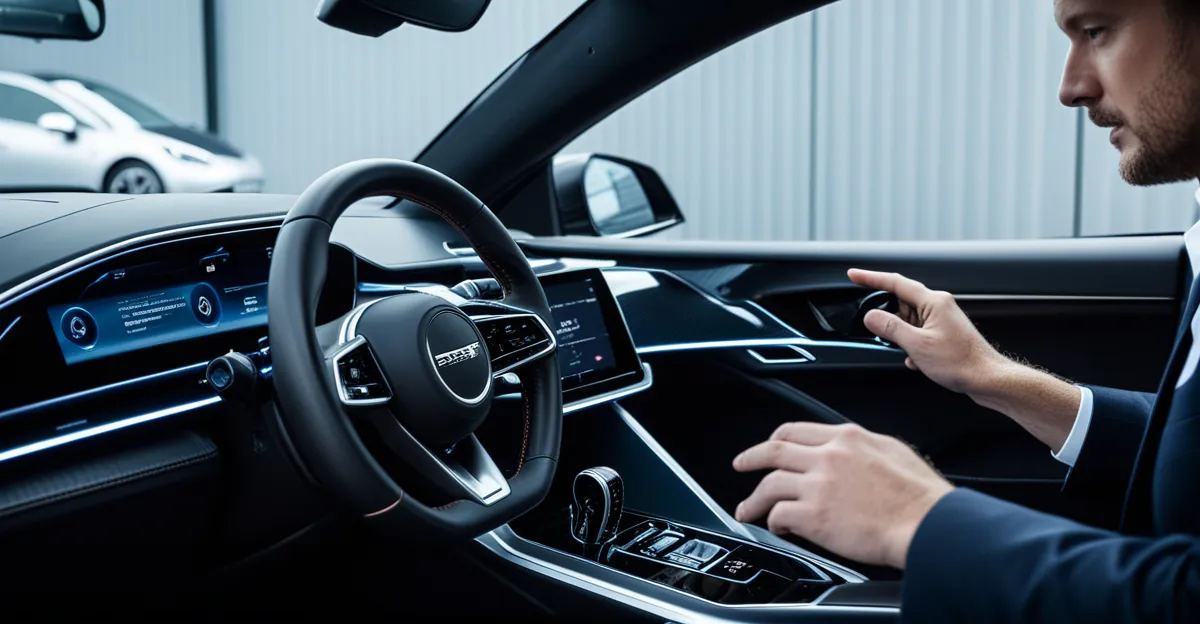Overview of Transformative Technologies in the UK Automotive Industry
The UK automotive innovation landscape is rapidly evolving, driven by several transformative technologies reshaping the sector. Emerging automotive technologies in the UK focus heavily on electrification, digitalisation, and sustainable practices. A key driver behind this industry transformation is the increasing demand for cleaner, smarter vehicles, alongside tightening environmental regulations.
Market trends highlight consumer preferences shifting towards electric and connected vehicles, pushing manufacturers to adopt cutting-edge solutions. UK automotive firms are investing in advanced batteries, autonomous systems, and AI-powered features to remain competitive globally.
This might interest you : What role does artificial intelligence play in UK vehicle manufacturing?
Government policies also play a crucial role in accelerating innovation, offering incentives and funding to facilitate technology adoption. This synergy between regulatory support and industry investment stimulates a dynamic environment where innovations thrive.
Overall, the combination of industry transformation and emerging automotive technologies in the UK underlines a pivotal shift toward a more sustainable, connected, and intelligent future for the automotive sector. This transition not only addresses environmental concerns but also enhances user experiences and operational efficiencies across the market.
In the same genre : What are the UK’s plans for developing hydrogen fuel infrastructure?
Electric Vehicles and Advancements in Battery Technology
Electric vehicles UK are rapidly transforming the automotive landscape, with adoption rates surging due to several factors. Battery technology innovations play a central role in this growth by improving energy density, charging speed, and overall efficiency. UK EV developments have particularly focused on solid-state batteries, which promise safer, lighter, and longer-lasting power sources compared to traditional lithium-ion options.
Government policies significantly boost EV uptake by offering grants, tax incentives, and investments in charging infrastructure. These measures address common consumer concerns such as range anxiety and cost, making electric vehicles UK more accessible.
Key advancements include ultra-fast chargers and expanding public networks, enabling smoother long-distance travel. Additionally, research into battery recycling reduces environmental impacts, aligning with wider sustainable automotive trends in the UK.
Together, these factors position electric vehicles UK as a cornerstone of the country’s industry transformation, reflecting growing consumer demand for cleaner transport and the commitment to meeting stricter emission targets. The synergy between technological innovation, government support, and market readiness accelerates the transition toward a more electric future in UK motoring.
Autonomous Vehicles and Connected Car Solutions
The UK leads progress in autonomous vehicles UK development through extensive self-driving car trials and evolving regulatory frameworks. These initiatives aim to ensure safety while encouraging innovation. Government regulations increasingly support testing on public roads, helping refine autonomous systems under real-world conditions.
Connected cars are integral to this transformation. They use advanced connectivity to communicate with other vehicles and infrastructure, enhancing road safety and traffic efficiency. Features like real-time navigation, remote diagnostics, and driver assistance are becoming standard, improving the overall user experience.
The UK’s automotive sector actively fosters connected car solutions through partnerships among industry leaders, tech firms, and universities. Pilot projects demonstrate vehicle-to-everything (V2X) communication, integrating smart traffic lights and road sensors to optimize travel and reduce congestion.
Together, these advancements in autonomous vehicles and connected car technologies solidify the UK’s position as a front-runner in UK automotive innovation. This tech-driven industry transformation not only heralds new mobility paradigms but also addresses urban transport challenges, paving the way for a safer and more efficient driving future.
Artificial Intelligence and Machine Learning in Automotive Applications
Emerging automotive AI UK technologies are significantly enhancing vehicle safety and navigation systems. AI-driven features like advanced driver-assistance systems (ADAS) use machine learning car technology to detect hazards, optimize routes, and improve decision-making in real time. This enhances the overall user experience by providing safer, more intuitive journeys.
Machine learning also impacts UK automotive digitisation, streamlining manufacturing processes through predictive maintenance and quality control. Analytics derived from AI helps manufacturers reduce downtime and improve precision in production. UK automotive leaders are pioneering projects that integrate AI into autonomous functions, fleet management, and personalized vehicle settings.
One notable application is real-time image recognition enabling autonomous vehicles to interpret complex environments. Additionally, natural language processing enhances voice-controlled interfaces, making in-car interaction more seamless. These developments showcase how automotive AI UK and machine learning car technology are vital to the industry’s transformation, elevating safety, efficiency, and user satisfaction while reinforcing the UK’s position in global automotive innovation.
Leading UK Players and Government-Led Innovation Programs
The UK automotive industry leaders play a pivotal role in driving technological progress. Major manufacturers and tech firms collaborate closely to integrate cutting-edge solutions, including electric drivetrains and autonomous systems. These corporations leverage extensive R&D capabilities to maintain the UK’s competitive edge in global automotive markets.
Government innovation initiatives are equally influential. By providing targeted funding and strategic support, the UK government accelerates adoption of emerging automotive technologies UK. Programs focus on areas like battery development, AI integration, and connected car infrastructure. This financial and policy backing reduces barriers for manufacturers and startups.
Collaboration is another cornerstone of the UK’s industry transformation. Universities, research institutions, and startups join forces with established companies, fostering an ecosystem where ideas rapidly evolve from concept to prototype. For example, government-backed innovation hubs facilitate knowledge sharing and pilot testing.
Together, these elements ensure sustained momentum for UK automotive innovation. Industry leaders, government initiatives, and a robust innovation network collectively enable the development of advanced, market-ready automotive technologies UK, bolstering the sector’s dynamic transformation.
5G Connectivity and Next-Gen Mobility Services
5G automotive UK deployment is revolutionising connected transport UK by delivering ultra-fast, low-latency communication critical for next-gen mobility services. Integration of 5G networks enhances vehicle-to-everything (V2X) connectivity, allowing vehicles to exchange data instantly with infrastructure, other cars, and traffic management systems.
This real-time data flow improves safety by enabling quicker hazard warnings and adaptive traffic controls. Moreover, 5G facilitates advanced features like remote vehicle diagnostics, over-the-air software updates, and seamless infotainment experiences, which are becoming standard in UK automotive innovation.
Mobility technology powered by 5G also supports emerging services such as shared autonomous fleets, dynamic ride-sharing, and smart parking solutions. These rely on rapid, reliable communication to coordinate complex urban transport networks efficiently.
UK automotive industry leaders and startups are actively collaborating with telecom providers to pilot 5G-based projects, ensuring that infrastructure development aligns with automotive digitisation trends. Such efforts advance the ongoing industry transformation by creating an ecosystem where connected transport UK evolves towards safer, more sustainable, and user-centric mobility. This synergy underpins the future of intelligent transport systems across the UK.
Sustainable Materials and Green Manufacturing Initiatives
The shift toward sustainable automotive materials UK is a critical aspect of ongoing industry transformation. UK manufacturers increasingly adopt eco-friendly composites, bio-based plastics, and recycled metals to reduce environmental impact. These materials not only lower vehicle weight, improving energy efficiency, but also contribute to carbon footprint reduction throughout production.
Green manufacturing practices complement material innovation. Processes such as energy-efficient assembly lines and waste minimisation schemes illustrate the UK’s commitment to sustainable production. The government supports these initiatives via targets and funding aimed at promoting green manufacturing technologies across the automotive sector.
Recycling and circular economy models gain prominence in the UK car sector. Initiatives focus on reclaiming battery components and reusing plastics, fostering resource efficiency while lessening landfill waste. This holistic approach to sustainability ensures that both new vehicles and their manufacturing methods align with ecological goals.
Together, these advancements in eco-friendly cars UK and green manufacturing form an integrated strategy. They reflect how emerging automotive technologies UK are not only transforming vehicle capabilities but also addressing environmental responsibilities, reinforcing the UK’s leadership in UK automotive innovation.











